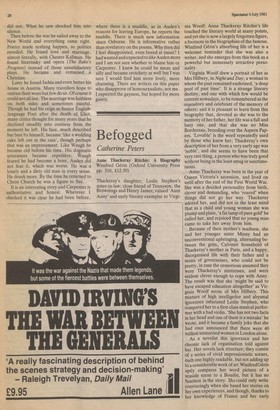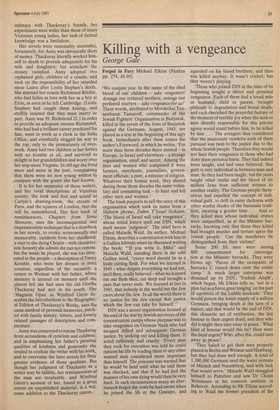Befogged
Catherine Peters
Anne Thackeray Ritchie: A Biography Winifred Gerin (Oxford University Press pp. 310, £12.50) Thackeray's daughter; Leslie Stephen's sister-in-law; close friend of Tennyson, the Brownings and Henry James; valued 'Aunt Anny' and early literary exemplar to Virgi nia Woolf: Anne Thackeray Ritchie's life touched the literary world at many points, and yet she is now a largely forgotten figure, a footnote in the biographies of the famous. Winifred Gerin's absorbing life of her is a welcome reminder that she was also a writer, and she emerges from this book as a powerful but immensely attractive personality.
Virginia Woolf drew a portrait of her as Mrs Hilbery, in Night and Day; a woman in whom the past remained enshrined, 'a deep pool of past time'. It is a strange literary destiny, and one with which few would be content nowadays, to be remembered as the repository and celebrant of the memory of others; and it is pleasant to learn from this biography that, devoted as she was to the memory of her father, her life was a full and busy one, and that she was no Miss Bordereau, brooding over the Aspern Papers. 'Lovable' is the word repeatedly used by those who knew her; Thackeray's own description of her from a very early age was 'noble', and she seems to have been that very rare thing, a person who was truly good without being in the least smug or sanctimonious.
Anne Thackeray was born in the year of Queen Victoria's accession, and lived on until after the end of the First World War. She was a decided personality from birth, clever and demanding, who 'roared' when things did not go her way. Thackeray adored her, and did not in the least mind that as a child and young woman she was plump and plain, 'a fat lump of pure gold' he called her, and rejoiced that no young man came to take her away from him.
Because of their mother's madness, she and her younger sister Minny had an unconventional upbringing, alternating between the grim, Calvinist household of Thackeray's mother in Paris, and a happy, disorganised life with their father and a series of governesses, who could not be pretty, in case the censorious assumed they were Thackeray's mistresses, and were seldom clever enough to cope with Anny. The result was that she 'might be said to have escaped education altogether' as Virginia Woolf wrote of Mrs Hilbery. This mixture of high intelligence and abysmal ignorance infuriated Leslie Stephen, who compared her to a first-class musical performer with a bad violin. 'She has not two facts in her head and one of them is a mistake' he wrote, and it became a family joke that she had once announced that there were 40 million unmarried women in London alone.
As a novelist this ignorance and her chronic lack of organisation told against her. Her novels lack structure; they consist of a series of vivid impressionistic scenes, each one highly readable, but not adding up to a considerable work of art.WinifredGerin aptly compares her word picture of a seaside scene to a Boudin, but it has no function in the story. She could only write convincingly when she based her stories on her own experiences, and though, thanks to her knowledge of France and her early intimacy with Thackeray's friends, her experiences were wider than those of many Victorian young ladies, her lack of factual knowledge was a limitation.
Her novels were reasonably successful; fortunately, for Anny was chronically short of money. Thackeray literally worked himself to death to provide adequately for his wife and daughters; but somehow the money vanished. Anny adopted two orphaned girls, children of a cousin, and took on the responsibility of her retarded niece Laura after Leslie Stephen's death. She married her cousin Richmond Ritchie, who had fallen in love with her as a boy at Eton, as soon as he left Cambridge. (Leslie Stephen had caught them kissing, and stuffily insisted that they must marry or part. Anny was 39, Richmond 22.) In order to provide an adequate income Richmond, who had had a brilliant career predicted for him, went to work as a clerk in the India Office, and eventually slogged his way to the top, only to die prematurely of overwork. Anny had two children in her forties with no trouble at all, and survived to delight in her grandchildren and worry over her step-niece Virginia. In old age she lived more and more in the past, complaining that there were no new young writers to • compare with the giants she had known.
It is for her memories of those writers, and her vivid descriptions of Victorian society, the look and feel and sound of Carlyle's drawing-room, the streets of Paris, and the squares of London, that she will be remembered. Her first book of reminiscences, Chapters from Some Memoirs, uses the inconsequential and impressionistic technique that is a drawback in her novels, to evoke, economically and memorably, incidents from her childhood: a visit to the dying Chopin — with characteristic honesty she admits she can not remember the music he played, she was too interested in the people — a description of Fanny Kemble, who wore her dresses in strict rotation, regardless of the occasion; a return to Weimar with her father, where memory is layered on memory until she almost felt she had seen the old Goethe Thackeray had met in his youth. Her 'Magnum Opus' as Winifred Gerin describes the Introductions to the Biographical Edition of Thackeray's Works, uses the same method of personal memories, patched with family history, letters, and loosely related passages of description and commentary.
Anny was concerned to rescue Thackeray from accusations of cynicism and coldness; and in emphasising her father's personal qualities of kindness and generosity she tended to confuse the writer with his work, and to overvalue the later novels for their greater evidence of those qualities. But though her judgment of Thackeray as a writer may be fallible, her reminiscences of the man are invaluable, and Winifred Germ's account of her, based to a great extent on unpublished material, is a welcome addition to the Thackeray canon.







































 Previous page
Previous page